QuestionI'm really worried about my bearded dragon spike.This last week he has been completly off his food, normally he devours his crickets and loves them but recently I can jus about get him to eat 1 or 2. Today however, all day he was very very quiet and not moving around in his tank. He is normally frisky and active, but today his whole body was dark in colour with black veins all over his tummy and his neck was blackening too and when I took him out of his tank for his usual run around he didn't move he jus lay on
the sofa all lethargic and quiet. Which is totally out of character, he normally runs around and explores. I put him back, under his heat lamp and after a little while I went to check on him and he was very dark all over again and he was lying flat in his tank with his hind legs stretched out flat behind him.completly flat. Please help. I love him so much and I'm so worried.p.s ive had him for 2months, the pet store said he was 9m when I bought him. He has uvb on for 12hrs everyday and he has a heat lamp hot end is 95 and
cool end is 8O. His tank has no sand it is tiled but when I first got him he did have sand (calci sand) cuz the pet store recomended it but after loads of research I got rid. He has fresh veg,and a small bowl of water everyday and I feed him (normally)about 10-15 crickets a day and dust them with calcium about 2-3 times a week. I bath him 1s a week and spray him everyday.
AnswerHi Vikki,
As they get older they do need to have less insects and more of the dark, leafy greens such as collards, mustard greens, turnip greens, dandelion greens, etc... Generally once a week for crickets is enough.
The dark color can be a illness thing such as internal parasites..have a vet do a fecal check on him.
Basking temperatures should be a gradient of 95-105 degrees so do get those up to see if that helps.
Cool end for night can drop more, even into the low 70's. Try lowering those for night.
Good on removing the sand.
On uvb, there are good sources and bad sources of uvb. Here is a paragraph I wrote to help people out with good uvb lighting sources.
LIGHTING:
BD's need UVB, which is the special lights that come in fluorescent tubes or special screw in bulbs(mercury vapor)that are designed to produce uvb and heat. The tubes do not produce heat. UVB is needed by the BD to be able to absorb the calcium in the foods they eat. Without the uvb, they will develop metabolic bone disease. With the tubes, they must say that they produce BOTH uvb and uva. The uvb needs to be 5% or higher. Repti Sun 5.0 and 10.0(not compact) are TWO of the best uvb tubes on the market. The repti glo 8.0's are a great uvb source also. Arcadia 5.0 (UK), which is the uvb tube available in the UK is a good uvb tube. These need to be positioned 6-8 inches(for the 5.0 and 8.0 and 8-10 inches for the 10.0) over the BD so that they get the uvb that is needed. Recommended length of the tube is 24 inches or more. They need to be replaced every 6-9 months as that they stop producing uvb long before they stop producing light. They need to have access to uvb and basking temperatures for 10-12 hours daily. At night, no white lights!!!
There has been new studies that have proven that compact uvb lights, both the spiral/coil type and the ones that look like long "U's" laying on their side and a few other brands are causing what basically amounts to snow blindness in reptiles. The companies have corrected the problem but, there may still be some of the earlier manufactured bulbs out there so be sure to double check what you are using, or even if you are using proper uvb source. To read more on this, you can go to
http://www.uvguide.co.uk/index.htm
The companies have been working to correct the problem with the lighting so its important to know if the light you have MAY be the old version.
This link will take you to my discussion group and to a post that tells how to tell the new compacts from the old ones. http://pets.groups.yahoo.com/group/UVB_Meter_Owners/message/6721
There are tubes and bulbs that say ''full spectrum'' but they do not produce any uvb.
On the mercury vapor , they also produce heat. They also produce the uvb and uva. The best on the market now are the MEGA RAY or the T-Rex. www.reptileuv.com has more information on the Mega Ray lights. When using these, the distance is much greater than the uvb tubes and the directions must be followed that are listed for the light. When using the mercury vapor lights, you don't need to have one light for uvb and one for heat. The Mercury vapor lights provide both.
If he is eating his "salad" thats good.. if not, make any needed corrections in his care and if that doesn't help, a vet check up is needed.
Many times, its simply a needed correction on temperatures. This time of year most people are using air conditioning which completely changes the temperatures in the critters cages. Use a good thermometer. I like the acurite brand that has the little probe on the end of the wire. You place the probe directly under the basking area, at the beardies level. If its too cool, it can actually put them into an early brumation.
Are you getting storms in your area or are storms in the forecast? Many reptiles react to that and can "shut down" waiting for the storms to pass.
If after checking everything, I really recommend a vet to see if they can spot a problem.To find a vet that can treat reptiles:
http://www.herpvetconnection.com
http://www.arav.org/ECOMARAV/timssnet/amm/tnt_mdsearch.cfm
http://www.anapsid.org/vets/
Below are some good links for more info on beardies:
http://www.bio..miami.edu/ktosney/file/BDcare.html
http://www.sundialreptile.com/care%20sheet--bearded%20dragon.htm
http://www.blackninjakitty.com/herps/dragons
Most bearded dragons will take long naps (generally,if they are over a yr) in the fall.. this is called Brumation. is a form of hibernation. You can read more about that at
http://www.exclusivedragons.com/Brumation.html be sure to read this link as it tells you what to look for in brumation vs illness.
http://www.bio.miami.edu/ktosney/file/BDbrumate.html
http://worldofbeardeddragons.blogspot.com/2006/11/bearded-dragon-brumation-bruma...

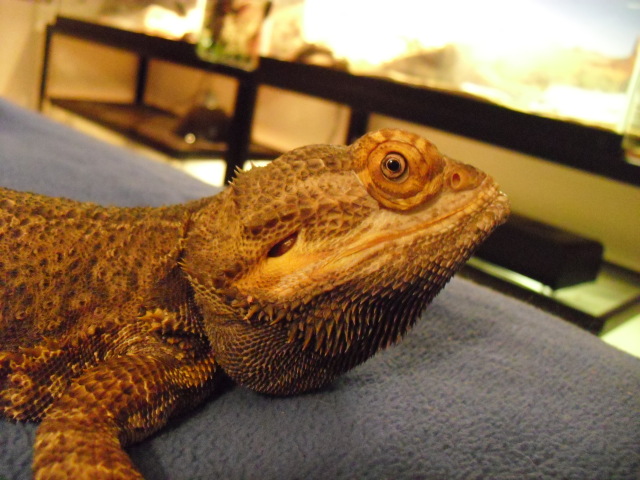 Bearded Dragon tympanic membrane (ear drum)
Question
Bearded Dragon
I noticed tonight that my drago
Bearded Dragon tympanic membrane (ear drum)
Question
Bearded Dragon
I noticed tonight that my drago
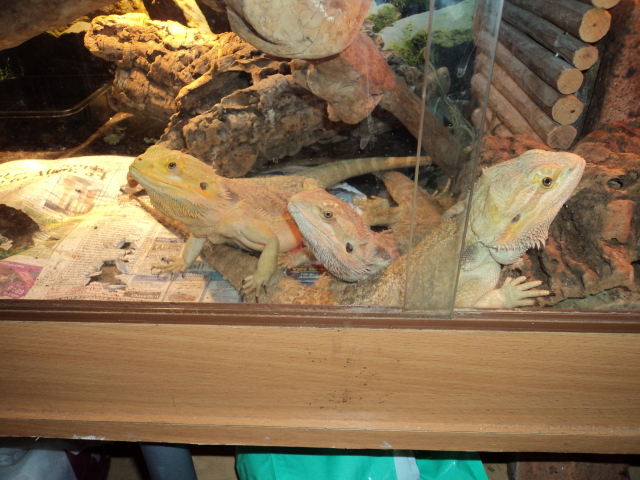 i need advise asap emergancey!
Question
koche ant the 2 girls
i have a 5 year old male
i need advise asap emergancey!
Question
koche ant the 2 girls
i have a 5 year old male
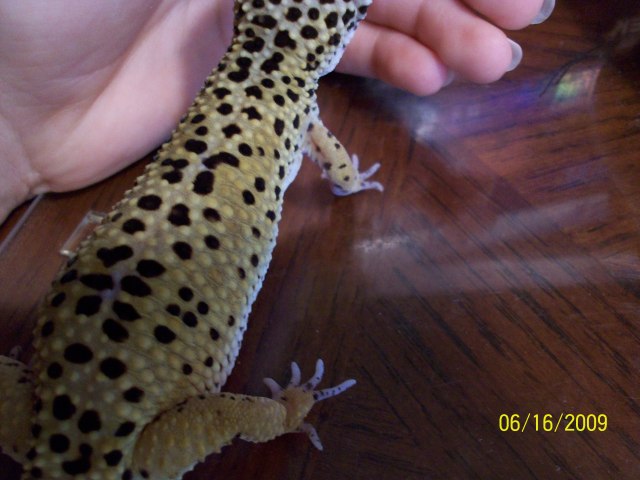 my leopard geckos health
QuestionQUESTION: Hello, I have a question about my leo
my leopard geckos health
QuestionQUESTION: Hello, I have a question about my leo
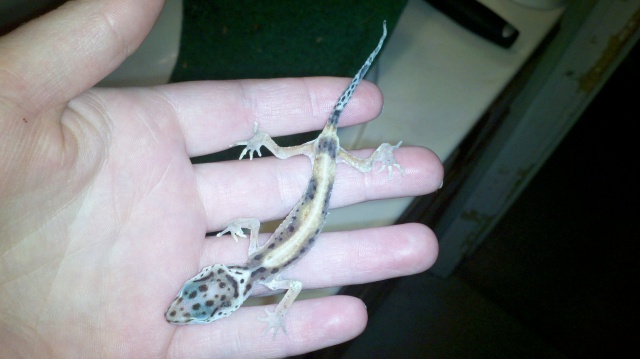 leo weight loss...
Question
Slinkz
My friend has a leopard gecko roughly 3
leo weight loss...
Question
Slinkz
My friend has a leopard gecko roughly 3
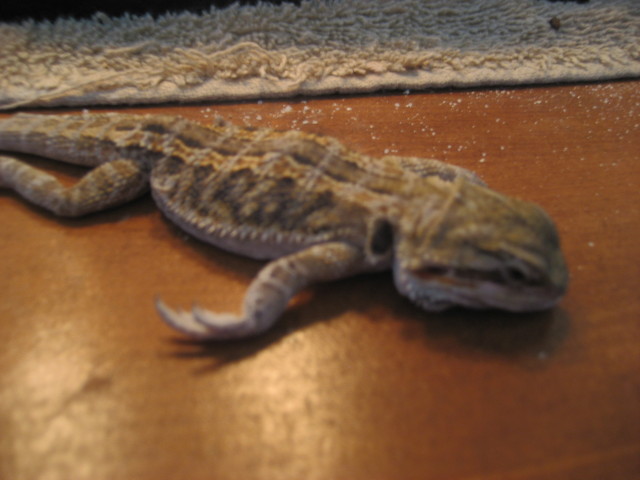 stomach blockage?
QuestionQUESTION: I got my first bearded dragon last ch
stomach blockage?
QuestionQUESTION: I got my first bearded dragon last ch